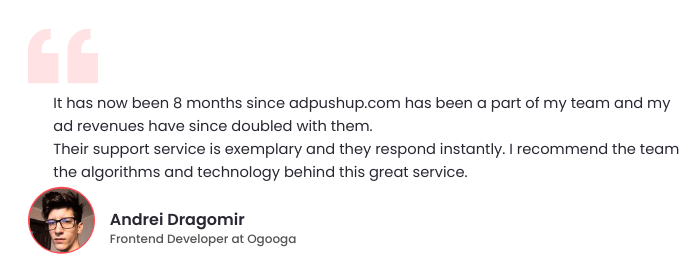We spoke to 15 known industry experts and asked them about the SEO strategies and tools that they recommend to increase traffic organically.
SEO has changed radically in the last few years. Whether your blog, website or online business is small or large, you probably rely on website traffic for sales and revenue. Most site owners know that a key component of modern SEO is creating quality content, but that’s only one part of the whole equation.
We spoke to 15 industry experts and asked them about the SEO strategies and tools that they recommend to increase traffic. Here’s what they had to say.
1. Jane Kryukova

Jane Kryukova is a copywriter and SEO expert from Texterra. She loves her work as it enables her to communicate with interesting people from around the world.
In our company, we specialize on all variety of traffic sources. We use content marketing, white hat SEO, guest blogging, email marketing, social media marketing and so on. We develop a personal online marketing strategy for each of our clients. This approach lets us achieve really great results.
In the era of global SERP personalization, website ranking is not the best metric at all. We prefer analyzing the effectiveness of our work by the following metrics: traffic, sources of traffic, conversion rate, leads quality and so on. Nevertheless, if a client wants to see his website rankings, we use MozPro.
2. Adam Connell

Adam Connell is a marketing director of UkLinkOlogy.
There are a large number of traffic generation tactics that I use, but the ones that provide the best results include:
- Publish the right content: Find out what content is trending & what your audience wants to know. Remember, your audience should be at the core of your marketing.
- Influencer outreach: Connecting with mid-top tier influencers can work wonders. Write great content, mention an influencer when relevant, and let them know about it.
- Relevant niche communities: Find out the communities where your ideal audience is hanging out, and find a none spammy way of putting your content in front of them.
- Build an email list: Once people are on your site, you need to find a way to keep them coming back. This is the best way to do it. Ultimately, you’ll be creating an asset over the long term and you’ll have control over it.
Recommended tools: I don’t use many. I use SE Ranking to monitor my sites rankings, but I also need to know what my competitors are ranking for — that’s where tools like Ahrefs and SEMrush come in. With those, I can see where my competitors rank for keywords I’m not tracking yet.
3. Melissa Lee

Melissa Lee is the head of product marketing from Allin1Social.
Commenting on quality and high authority blogs in your niche has so far brought the best traffic for us. Remember to use social media logins or Disqus when you comment.
Make quality and relevant statements and try to create engaging conversations instead of mainly trying to promote your own business. Don’t get too caught up with trying to insert keywords relevant to your brand in every comment. If you want quality traffic, then your comments need to be genuine and of good quality as well.
Once you run out of topics in the niche, go for blogs that suit your long-tail traffic! It’s a never-ending but very enjoyable journey.
Recommended tools: We use a combination of tools, but we have now chosen to stay with SEMrush. It is quite a holistic suite of tools and satisfies most of our needs.
We’re able to monitor our competitors, and compete better over some keywords. It’s also been helpful to discover new keywords that have helped our competitors — which is now helpful for us.

4. Cormac Reynolds

Cormac Reynolds is a company director from My Online Marketer.
We do a lot of content marketing and find that this can be a great way to receive traffic in the immediate and also in the long term through search rank improvements.
A good guest post should send referral traffic and often it can help lift the site’s rank in the search results – so I find it helps. Other things we’ve experimented of late include answering Quora and Wiki answers. Additionally, we also create resources for Wikipedia, if a site is suited and this can help traffic too.
Recommended tools: I like to use AHrefs at the moment. The link index is so up to date it’s crazy and the new Positions Explorer tool is really great too and takes the best of a backlinks explorer and SEMRush’s positions explorer and pulls them together.
5. Tom Shivers

Tom Shivers is a president of Capture Commerce.
In the past, say three years ago, I would go after keywords with the highest volume and relevance and often the client would demand top rankings for these as well.
The problem with that approach is the assumption that those people searching have intent alignment with your business goal.
Until there is a clear evidence or unquestionable intent that the keyword is a perfect fit and does bring in revenue or quality leads, it’s still an assumption. A better question now might be: How can we identify the top performing keywords and get more traffic from them?
6. Sujan Patel

Sujan Patel is a data-driven marketer and entrepreneur. He is also the co-founder in a number of SaaS companies including Right Inbox, Voila Norbert and Mailshake.
Launching a site and getting it off its feet by building an initial following of a few hundred and then a few thousand regular visitors is quite often the hardest part of the whole process. Don’t be surprised if going from from 0-10K monthly visitors takes longer than going from 10K to 50K, and 50K to 100K. My main piece of advice is stick with the process. If you keep working hard on optimizing your site, producing good quality content the traffic increases will naturally come.
7. Arsen Rabinovich

Arsen Rabinovich is a founder of TopHatRank and owns a search and social marketing agency.
Generating traffic quickly is not easy, but it can be done!
All you need is some time, some creativity and a little bit of money (not a lot).
I would start by doing some research to:
- Understand who your audiences are.
- Figure out where they congregate online for education, information and recreation.
- Analyze what types of content resonates with them the most.
Recommended tools: We use a few tools. Raven grabs data from Webmaster/Search Console, AgencyAnalytics gives us results directly from SERPs and allows localization. Both provide branded, white-label reports and allow you to integrate their online reporting directly into your website.
8. Pam Sallegue

Pam Sallegue is a digital marketing manager and copywriter of PamSallegue and Seo-Hacker websites.
The good thing about SEO Hacker is that it already has great traffic from five years ago, and we maintained that.
However, we also get traffic from communities such as Quora, Growth Hackers, and Inbound.org, and organic traffic as we’re able to manage to rank for particular (and really good) keywords.
Recommended tools: We use SE Ranking, SEMrush.
9. Tadeusz Szewczyk

Tadeusz Szewczyk helps people with blogs, social media, and search. He runs the website called Onreact.
First off, let me say that the value of sheer traffic gets overestimated in many cases. You can have lots of traffic, but not make any substantial money. Indeed, I had this problem for quite a while. I even prefer not to use the traffic metaphor altogether. Instead, I prefer to focus on visitors. It’s not solely about semantics.
Traffic is basically about an anonymous mass of vehicles driving by your site without really stopping. We’re not all drive-through business owners are we? With visitors, you are considering each and every individual. You are treating people who visit you as guests. Imagine yourself to be a hotel owner. Then you also realize that you do not necessarily need more visitors, but better ones, those who are more affluent or those who at least don’t damage your rooms.
When it comes to visitors, I prefer the people who I already know and who have been faithful along the years. I don’t even think my paying clients are the most important ones. Sometimes my online friends or true fans who have supported me for years are more valuable in the long term than a client. Like a hotel owner, I try not to get the masses to flood my property and to deface my walls with obnoxious or self-promotional comments.
I try to get specific visitors back to my site. In general, I attempt to get a 1/3 direct traffic (returning visitors, subscribers, type in traffic), 1/3 social media visitors, 1/3 organic search visitors.
I pride myself to be an optimizer, not a marketer and thus I don’t buy traffic from gatekeepers like Google or Facebook. I even blocked Google search on my blog for 2 years to test whether I can get by without interference from the search monopolist who wants to tell me how to link or not. It worked to some extent.
Personally, I mostly socialize on Twitter, Google+ and Inbound.org when it comes to my blogging, social media, and search business.
For other sites or clients, I choose the places to mingle with audiences on a separate basis. For example, I promote my cycling blog on Pinterest after it had huge success there by itself already several years ago. In general, I try to shun low value or harmful traffic from sites like Reddit or Hacker News where you get huge bounce rates around 95+% and where the remaining few defecate on your site with abusive comments.
I have to admit that I don’t check rankings much these days. In many cases they are almost meaningless as even the #1 spot on Google may be below the fold or a so-called “rich answer” where Google gets rich by stealing the answer from your site and displaying it right on Google. I use a tool that sends me ranking reports regularly, but I won’t advertise it here because it got worse after a recent relaunch and I do not really like it anymore.
10. Zac Johnson

Zac Johnson is an internet marketer, entrepreneur, super blogger, and owner of ZacJohnson website.
When attempting to get traffic to my site, I use a simple yet effective formula. First, I will plan out the content I’m going to create and try to make it better than other competitive content out there. I will include references, examples, and high-quality sources. A good example of this can be seen here — specifically because it has a lot of high profile bloggers that might retweet/share it as well.
Once the content goes live, I then need to focus on my outbound reach, which includes social media sharing and most importantly guest blogging. Through the use of guest blogging on other high profile sites, I can link to other relevant resources around the internet, and my own content when it fits accordingly. Backlinks are important not only for getting your site in front of other people, but it’s also how Google puts higher authority on your sites as well. The higher quality and more relevant a site is to your own site content, the better.
In the end, it’s not just about creating content… it’s being able to effectively promote it once it goes live. To learn more about guest blogging, you can view my best practices.
11. Sean Si

Sean Si is an SEO specialist, web developer and blogging coach on SEO-Hacker.
I receive traffic in several different ways. Let me point out two:
For the SEO Hacker blog, most of my traffic come from search – 78.1% of it. That’s a significant amount. The blog gets around 30,000 sessions each month. How we’ve been able to build this is by writing, publishing and promoting evergreen content with a 10x improvement from its nearest comparison.
For Qeryz, most of our new traffic come from referrals — 25.7%. Direct traffic makes 40.1% of our entire traffic. The reason why referrals tops search is that Qeryz has a natural engine of growth because it’s a front-end widget with a link on the footer of the widget. We’re working on getting Qeryz searchable, but the nature of the product is pretty hard to position in the market — hence, it’s hard to position as a keyword as well.
Recommended tools: For my rankings, my favorite tool is SERanking — hands down. It keeps track of my rankings even while I’m asleep and the results are accurate to the actual locality. I just can’t imagine rank tracking without it.
12. Jordan Kasteler

Jordan Kasteler is the digital marketing strategist for the agency MWI, professional blogger and internet marketing consultant.
Research of not just keywords, but your targeted audience. Who are they and what do they want or need?
Keyword research can help tell you what your audience wants, but talking to individuals and creating personas is complimentary.
Once you know this info you can create compelling content that’ll attract the right people. Content can’t stand on its legs without promotion, though.
It’s important to go to where your audience hangs out (e.g. social communities) and attract their attention through there.
If you attract enough attention, a good percentage of those people will be a strong influence in bringing their audience to your site as well.
On the search front, the more links and shares you get, the more keywords you’ll rank for and organic traffic you’ll receive.
Recommended tools: Raven, Linkdex, SEMrush, Google Search Console, SEO Tools Rank Checker, and SERanking.com
13. Chloe Smith

Chloe Smith is the director of Twig Communications and helps startups discover the power of creative communications.
Truthfully, the only way to driving traffic quickly is through paid advertising. Organic SEO takes time and quality content.
However, paid advertising in conjunction with quality content can literally BUY you the time to build your organic SEO.
One of the tools we use to develop smart headlines is CoSchedule. It’s a free tool that every content marketer should use prior to clicking “publish”. If you think of content marketing as 20% writing and 80% promoting, then you’ll certainly see results.
Recommended tools: We use good old Google Analytics. It’s relatively easy to use, it keeps you on Google’s good side and it’s grossly underutilized. There are a ton of courses online that teach the ins and outs of Google Analytics, so there’s no reason can’t get most (if not all) your analytic needs from there.
14. David Trounce

David Trounce is the consultant, SEO specialist and web designer. He is the author of Mallee Blue Media.
I tend to go to those places on the web where my target market is. One of those places is Quora. By contributing answers to users in my target market who are asking questions, I have been able to get a steady stream of qualified traffic.
Another, since I am interested in communicating with the business sector, is the American Express Forum and Flying Solo.
My link and brand are mentioned in these forums, so I don’t need to sell anything. The goal should be to contribute something useful to those who have a need that you can fill. One way of doing this is to give away some genuinely decent advice and to follow up with those people at some point down the track.
If you want to build traffic to your site beyond organic search results in Google, start asking the question, “Where do my clients or customers hang out online, and how can I join in their conversation and be useful?”
You may not get a thousand visitors by doing this (unless you are in an extremely viral space) but what you will get are targeted visitors who will often have their credit card in one hand while typing your URL with the other.
15. Graeme Watt

Graeme Watt is the online strategy manager for The Zen Agency which is a digital agency in Glasgow, Scotland.
In order to get organic traffic to the website through SEO you must do a variety of things including:
- Keyword research;
- On Page optimization (don’t forget optimized descriptions although not a ranking factor it can affect click through rate);
- Target long-tail keywords through content creation, created content should be 10x better than anything else which is currently out there;
- Write on a consistent basis (create a content plan);
- Promote any content which is created through social media and other relevant channels. Better content promotion will lead to an increase in views and potential links;
- Include images in your content and be sure to optimize with alt tags.
Recommended tools: Google analytics can provide insight into traffic including where the traffic is coming from. SEMRush can be used for keyword research and is an excellent competitor analysis tool.
Google search console provides data on rankings, the number of times your website appears against search queries and can be used to compare mobile and desktop traffic.
16. Eric Siu

Eric Siu is an SEO expert and guest writer to many famous websites like Entrepreneur, SEwatch and more.
- Сonsistency is key. Think of it as compounding interest.
- For free tools, I like Google search console.
—
This is a guest contribution by Irina Weber, marketing director at SE Ranking. She holds a deep interest in internet marketing, online business, and search engine optimization.
FAQs
You can attract highly targeted visitors to your site at scale using search, display, and social ads.
According to 40.4 percent of respondents, written content attracts the most website traffic. In terms of driving traffic to their websites, 34.3 percent view video content as the most effective form of content. 25.3 percent of respondents cite visual content as the top traffic-generator
A Strong SEO Strategy Has Three Key Components:-
i. Crawling, indexing, formatting, and links all contribute to ranking.
ii. Your website’s quality content sets it apart from the competition.
iii. Measure your SEO strategy’s effectiveness.
A growth blog for professional bloggers and ad ops professionals.








